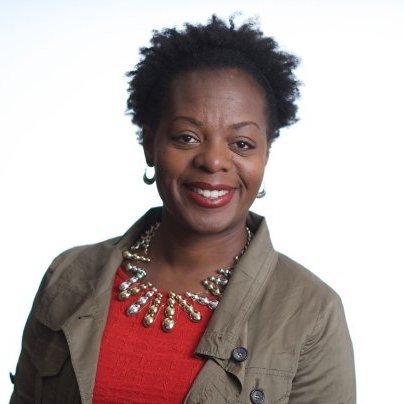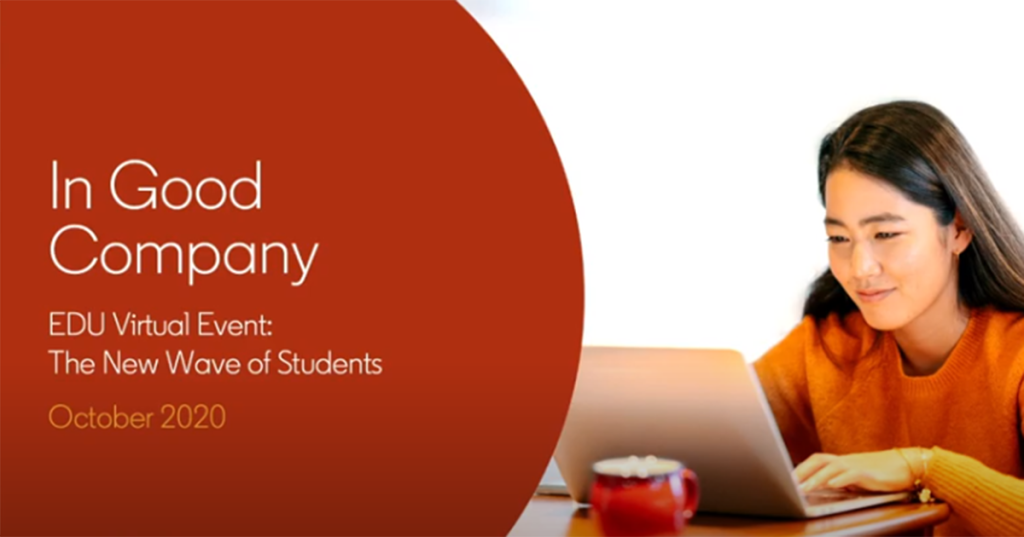Engaging and Activating the New Wave of Students in Higher Ed
For adult learners, the time is now. New research shows that interest among professionals in pursuing higher education is up considerably, with a new wave of students actively researching and weighing their options. This brings with it a mixture of excitement and uncertainty.
Marketers in higher ed have a unique opportunity to guide and assist prospective students in this journey. At LinkedIn, we’re inspired by everyone who plays a role in higher ed’s critical ecosystem of prospecting, enrolling and educating students. We’re well positioned to be a strategic partner to higher ed marketers.
Interest in Higher Ed is Rising Fast
During our recent “New Wave of Students” event, Elizabeth Scarborough Johnson unveiled for the first time new market research conducted by SimpsonScarborough and LinkedIn around prospective adult students in the current climate.
The report includes some eye-opening insights. You’ll be able to learn about them in greater depth by joining Elizabeth’s webinar on Dec. 3rd, but she shared some key takeaways, including:
- Nearly 1 in 2 adult learners said their interest in pursuing additional education has increased since the advent of COVID-19.
- 2 out of 3 respondents are in an active consideration phase, and 1 in 2 has plans to enroll within six months. (Among LinkedIn members, these figures rise to 77% and 64%.)
- 8 out of 10 adult learners are interested in pursuing online education. (85% of LinkedIn members compared to 73% of non-members.)
The bottom line, according to Elizabeth: Adult learners are moving quickly, interested in online degree and non-degree programs, and desire affordable, highly flexible and usable options that increase their earning potential.
It’s a new world, though. Many of these individuals are exploring higher education options for the first time, and even those who are familiar with the landscape might have less knowledge around online programs, not to mention smaller-scale opportunities like boot camps.
Institutions and their marketers need to meet these students where they’re at with a message that connects with their needs (and dreams).
What Is the New Wave of Students Seeking to Accomplish?
Everyone has their own goals, their own aspirations, and their own reasons for pursuing education as an adult. The best marketers and organizations know how to speak to these varying motivations through highly tailored and customized content.
But from a broader strategic level, it’s helpful to understand overarching trends. Here too, the market research offers some revealing findings:
- Interest is high in all program offerings: Taking for-credit courses, earning for-credit certificates, beginning masters/professional/doctoral programs, taking a non-credit course, beginning an associate’s degree program, etc.
- 55% of respondents named "increasing my earning potential" as a desired benefit of additional education.
- The top three most desirable attributes in a potential school were, in order: affordability, flexible scheduling/work-life balance, and high-quality & user-friendly online platform.
There are of course very basic and straightforward “dollars and sense” drivers at play, as evidenced by the earning potential and affordability responses. But there are also deeper and more emotional motivators behind adult learning ambitions. Undertaking this challenge, navigating it successfully, and opening up new career avenues can be fulfilling and enriching.
Marketers are wise to think about those deeper anchors in the context of the aforementioned surface drivers. Most of us in this field have a pretty good idea about why adult learners seek educational opportunities generally, but why is the new wave making a push at this very moment? What are the specific reasons they might value these programmatic offerings, or qualities like affordability and flexibility?
“It's really important to be delivering on that full value proposition to really create your brand. That's where differentiation comes from," said strategist and author Michael Horn in response to how programs need to think about their messaging strategy. “The more you can identify in their context their situation, and what are those emotional and social reasons they’re doing something, the better you can reach them, and they'll see your school and them as the perfect match.”
The Online Learning Landscape
One elevated priority from the list above isn’t too difficult to understand: students want high-quality and user-friendly online platforms because, for the time being, that’s how learning is done.
However, Elizabeth does warn not to over-index against this trend. Eventually we’ll move back toward a hybrid setting where in-person learning is a bigger part of the picture and it’d be short-sighted to permanently diminish this aspect of your value proposition.
With that said, online learning capabilities are clearly pretty important to emphasize in any 2020 messaging for higher ed marketing. Some questions to consider when positioning your institution’s online programs:
- How can we differentiate our offering, and make it seem more appealing when we know that people tend to question the value and experience of learning through a screen?
- Along those same lines, what are some interactive and engaging elements of our online learning programs that stand out?
- Knowing that prospective students prioritize accessibility and ease-of-use (not to mention speed), how can we market directly to these interests? (Think sprint courses, boot camps, etc.)
- In what ways can we leverage data to gain more clarity around our audiences, what it’s looking for, and what it responds to?
In many ways, modern schools are ahead of the curve on this trend, which isn’t exactly an unforeseen one.
“The quality ratings from students for online programs that have been professionally developed are as high as they've ever been — in fact, on par with the ratings of in-person education,” said Brandon Busteed, President of University Partners and Global Head, Learn-Work Innovation for Kaplan.
David Sutphen, Chief Strategy and Engagement Officer for 2U, agrees. He says the modularity of online learning is well suited for the changing needs of today’s students. “The online learning experience can be as good if not better, because of the dimensionality, the flexibility, and the trend we see of consumers expecting their learning experiences to be more like their media and entertainment experiences,” he said.
Higher Ed Marketers Are In Good Company with LinkedIn
As a social network that is fully focused on learning, networking, and professional advancement, LinkedIn offers an ideal environment to reach and engage with prospective adult learners:
- 90,000 schools are listed on LinkedIn
- There are 65 million students and recent college grads among LinkedIn's member base
- More than 1.8 million leads were generated for U.S. schools on LinkedIn in 2019
- 232,000 undergrad and grad enrollments driven through partners on LinkedIn in 2019
These numbers are only on the rise; in 2020 we're outpacing the number of leads generated in 2019, and the number of enrollments that LinkedIn helped drive is up 62% compared to last year.
Why does our platform provide such a conducive environment for engaging with these audiences? It comes down to three fundamental characteristics of LinkedIn.
- Quality: People come to LinkedIn for credible information and insight from sources they can trust. (We’ve been ranked the most-trusted social platform three years straight.)
- First-party data: Dependable profile information provided by members, who are motivated to keep the details accurate and updated.
- Mindset: People come to LinkedIn with an eye on personal and professional growth, and are receptive to messaging that aligns.
The people, tools, and opportunities are here. A new wave of students is ready to make their splash. Learn more about their unique circumstances and how best to engage them on LinkedIn by replaying the full virtual event below, or joining us on Thursday, December 3rd for our next event: Introducing Insights on the New Adult Learner, where we will be sharing more research results and insights on the new wave of students.



